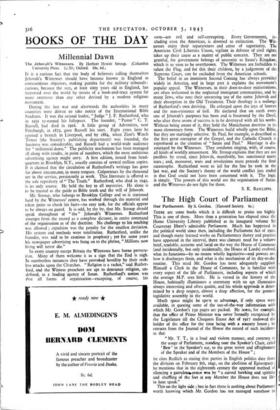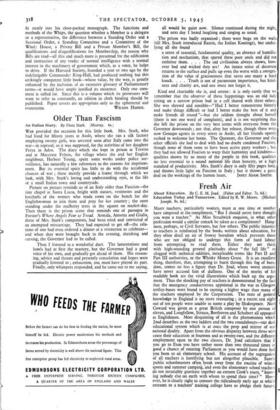The High Court of Parliament
Our Parliament. By S. Gordon. (Hansard Society. 6s.)
THERE are some books which it is difficult to praise too highly This is one of them. More than a generation has elapsed since the Home University Library published as its inaugural volume Sir Courtenay Ilbert's admirable Parliament. Much has happened in the political world since then, including the Parliament Act of 1911. and though many learned works on Parliamentary theory and practice have appeared in the interval, there was- clamant need for a volume brief, readable, accurate and lucid on the way the House of Commons (and incidentally, but only incidentally, the House of Lords) evolved. what its functions—by no means wholly legislative—and powers arc% how it discharges them, and what is the mechanism of its day-to-day routine. This need Mr. Gordon has most adequately supplied. . Himself a Clerk in the House of Commons, he is familiar with every aspect of the life of Parliament, including aspects of which the average M.P. sees little. He is versed in the history of the House, habitually illuminates a statement with an apt illustration always interesting and often quaint, and his whole approach is deter- mined by a deep respect, almost a deep affection, for the greatest legislative assembly in the world.
Much space might be spelt to advantage, if only space were available, in quoting some of the out-of-the-way information with which Mr. Gordon's 150 pages are packed. He notes, for example. that the office of Prime Minister was never 'formally recognised by the Legislature till the Chequers Estate Act of 1917 endowed the holder of the office for the time being with a country house • he extracts from the Journal of the House the record of such incidents as that
"Mr. T. T., in a loud and violent manner, and contrary to the usage of Parliament, standing near the Speaker's Chair, cried Baw ' in the Speaker's ear, to the great terror and affrightment of the Speaker and of the Members of the House " ; he cites Redlich as stating that parties in English politics date from the division on February 8th, 1641, on the abolition of Episcopacy ; he mentions that in the eighteenth century the approved method of silencing a garrulouaborator was by " a cursed hawking and spitting and shuffling of the feet at any Member the House does not like to hear speak."
This on the light side ; but in fact there is nothing about Parliament worth knowing which Mr. Gordon has not managed somehow to fit neatly into his close-packed monograph. The functions and methods of the Whips, the question whether a Member is a delegate or a representative, the difference between a Standing Order and a Sessional Order, a Standing Committee and a Committee of the Whole House, a Private Bill and a Private Member's Bill, the qualifications and disqualifications for Membership, the reason why Bills are read—all this and much more is presented for the edification and instruction of any reader of normal intelligence with a normal interest in the machinery of government which, as a voter, he helps to drive. If the Hansard Society, founded a year or two ago by the indefatigable Commander King-Hall, had produced nothing but this strikingly competent little book—whose value, by the way, is greatly enhanced by the inclusion of an extensive glossary of Parliamentary terms—it would have amply justified its existence. Only one com- ment is called for. Sinze this is a volume which its possessors will want to refer to constantly, an edition in cloth binding should be published. Paper covers are appropriate only to the ephemeral and



























 Previous page
Previous page